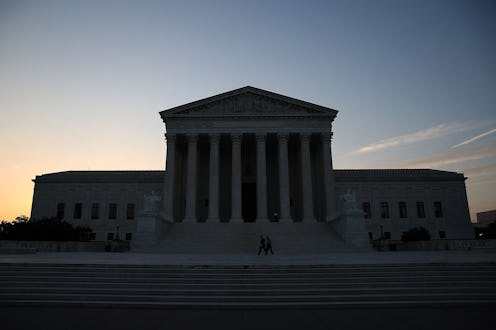News
Supreme Court Rules in Favor of Same-Sex Couples

In its latest ruling on the rights of married same-sex couples, the Supreme Court ruled on Monday against an Arkansas law that made lesbian couples get a court order to have a second mother listed as a parent on a child's birth certificate.
In 2015, the Supreme Court ruled that gay marriage was legal nationwide, and this most recent court decision further fleshes out the implications of that decision in that case, Obergefell v. Hodges. Citing that landmark ruling, an unsigned majority ruling said, "Arkansas law makes birth certificates about more than just genetics."
The law, requiring both a woman and a man be listed on a birth certificate, was initially upheld by the Arkansas state Supreme Court last December. The state's highest court ruled that married same-sex couples do not have to both be listed on a birth certificate, though Arkansas law permits a husband to be listed as his wife's child's father even if he is not the biological parent of the child.
Arkansas Supreme Court Associate Judge Jo Hart wrote in her majority opinion:
In the situation involving the female spouse of a biological mother, the female spouse does not have the same biological nexus to the child that the biological mother or the biological father has. It does not violate equal protection to acknowledge basic biological truths.
The Supreme Court's decision stated that the Arkansas high court's ruling was unfair, given what was established in the Obergefell ruling. "The Arkansas Supreme Court's decision, we conclude, denied married same-sex couples access to the 'constellation of benefits that the Stat[e] ha[s] linked to marriage,'" the Supreme Court's statement said.
The highest court's right-leaning justices — Justices Neil Gorsuch, Clarence Thomas and Samuel Alito — all dissented.
The Supreme Court is expected to make other crucial decisions on Monday, its final day in session. One case under the court's consideration explores whether or not religious organizations can receive government funding for secular programs.
Another is whether it will hear a case about the headline-making temporary travel ban that President Donald Trump attempted to impose on travelers from majority Muslim countries. Prior to arriving at the Supreme Court, the travel ban case had been heard by circuit federal judges who found that the administration's policy amounted to religious discrimination. The Trump administration has argued that its ban serves a national security purpose.
As for the rulings about the rights of married gay couples, it remains to be seen how the court will continue to uphold Obergefell's legacy and precedent, as it also agreed on Monday to hear a case about whether or not businesses have the right to discriminate against gay couples based on personal religious beliefs. At least gay couples' rights with regards to bring a child into the world are solidified for now.